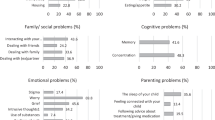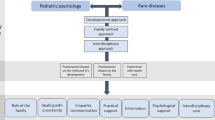Abstract
Rare diseases are chronic and sometimes life-threatening conditions which differ from others due to less definite identity and more difficult clinical management. These peculiar features may hinder the parental adaptational process. The study aimed to compare the emotional burden and coping strategies of parents of children with rare diseases (CRD) with those of parents of children with chronic diseases (CCD). Quality of life, anxiety, depression, and mood states of 55 parents of CRD and of 56 parents of CCD were assessed by specific validated assessment tools. Parametric and non-parametric tests were used for multiple comparisons. Bivariate correlations were employed to explore the relationship between coping and emotional burden. Parents of CRD were more anxious, more confused–bewildered, and less active–vigorous than those of CCD (p < 0.001). Parents of CCD preferentially used some problem-focused and emotion-focused strategies (active coping, seeking instrumental social support, and positive reinterpretation and growth), whereas parents of CRD more often turned to religious coping (p < 0.001). The indefinite and uncertain identity of rare diseases hindered the adaptational process and appeared to impede the use of active coping, seeking instrumental social support, and positive reinterpretation and growth, that was correlated to higher level of vigor–activity among parents of CCD (p < 0.001). Conversely, the falling back on religious coping by parents of CRD didn’t result in improvement of any burden features. The main findings of the present study seem to suggest that both parents of CRD and those of CCD achieved good overall adaptation 1 year after child’s illness diagnosis, but they did so in different ways, showing slightly differences in emotional burden, probably due to the lack of available medical knowledge about diagnosis, prognosis and treatment of rare diseases. Therefore these findings stress the relevance of physician training and of providing information in the field of rare diseases.
Similar content being viewed by others
References
Adams-Greenly, M. (1986). Psychological staging of pediatric cancer patients and their families. Cancer, 58(2 Suppl), 449–453.
Brewer, H. M., Eatough, V., Smith, J. A., Stanley, C. A., Glendinning, N. W., & Quarrell, O. W. J. (2008). The impact of Juvenile Huntington’s Disease on the family: The case of a rare childhood condition. Journal of health psychology, 13(1), 5–16. doi:10.1177/1359105307084307.
Bruns, D., & Foerster, K. (2011). ‘We’ve been through it all together’: Supports for parents with children with rare trisomy conditions. Journal of Intellectual Disability Research, 55(4), 361–369. doi:10.1111/j.1365-2788.2010.01381.x.
Carver, C. S., Scheier, M. F., & Weintraub, J. K. (1989). Assessing coping strategies: A theoretically based approach. Journal of Personality and Social Psychology, 56(2), 267–283.
Christ, A. E., & Flomenhaft, K. (1982). Dis-synchrony of coping among children with cancer, their families, and the treating staff. In Psychosocial family interventions in chronic pediatric illness. New York, NY: Plenum Press.
Clarke, N. E., McCarthy, M. C., Downie, P., Ashley, D. M., & Anderson, V. A. (2009). Gender differences in the psychosocial experience of parents of children with cancer: A review of the literature. Psycho-oncology, 18(9), 907–915. doi:10.1002/pon.1515.
Conti, L. (2000). Repertorio delle scale di valutazione in psichiatria. Firenze, Italy: SEE.
Di Fabio, A., & Ghizzani, F. (2006). Satisfaction With Life Scale (SWLF) versione italiana. Counseling. Giornale Italiano di Ricerca e Applicazioni.
Diener, E., Emmons, R. A., Larsen, R. J., & Griffin, S. (1985). The satisfaction with life Scale. Journal of Personality Assessment, 49(1), 71–75. doi:10.1207/s15327752jpa4901_13.
Farnè, M., Sebellico, A., Gnugnoli, D., & Corallo, A. (1991). POMS: Profile of Mood States. Manuale Adattamento Italiano (Italian Manual). Firenze, Italy: O.S. Organizzazioni Speciali.
Fife, B., Norton, J., & Groom, G. (1987). The family’s adaptation to childhood leukemia. Social science & medicine (1982), 24(2), 159–168.
Goldbeck, L. (2001). Parental coping with the diagnosis of childhood cancer: gender effects, dissimilarity within couples, and quality of life. Psycho-oncology, 10(4), 325–335.
Grootenhuis, M. A., & Last, B. F. (1997). Adjustment and coping by parents of children with cancer: a review of the literature. Supportive care in cancer: official journal of the Multinational Association of Supportive Care in Cancer, 5(6), 466–484.
Gundersen, T. (2011). ‘One wants to know what a chromosome is’: The internet as a coping resource when adjusting to life parenting a child with a rare genetic disorder. Sociology of Health & Illness, 33(1), 81–95. doi:10.1111/j.1467-9566.2010.01277.x.
Hamilton, M. (1959). The assessment of anxiety states by rating. The British journal of medical psychology, 32(1), 50–55.
Hamilton, M. (1960). A rating scale for depression. Journal of Neurology, Neurosurgery and Psychiatry, 23, 56–62.
Hamilton, M. (1980). Rating depressive patients. The Journal of clinical psychiatry, 41(12), 21–24.
Hoekstra-Weebers, J. E., Jaspers, J. P., Kamps, W. A., & Klip, E. C. (1998). Gender differences in psychological adaptation and coping in parents of pediatric cancer patients. Psycho-oncology, 7(1), 26–36. doi:10.1002/(SICI)1099-1611(199801/02)7:1<26:AID-PON315>3.0.CO;2-0.
Koch, U., Härter, M., Jakob, U., & Siegrist, B. (1996). Parental reactions to cancer in their children. In L. Baider, C. L. Cooper, & A. Kaplan (a c. Di), Cancer and the family. Oxford, England: Wiley.
Kupst, M. J., Natta, M. B., Richardson, C. C., Schulman, J. L., Lavigne, J. V., & Das, L. (1995). Family coping with pediatric leukemia: Ten years after treatment. Journal of Pediatric Psychology, 20(5), 601–617.
Lammens, C. R. M., Bleiker, E. M. A., Verhoef, S., Ausems, M. G. E. M., Majoor-Krakauer, D., Sijmons, R. H., et al. (2011). Distress in partners of individuals diagnosed with or at high risk of developing tumors due to rare hereditary cancer syndromes. Psycho-oncology, 20(6), 631–638. doi:10.1002/pon.1951.
Latessa, V., & Frasier, K. (2007). Case study: A minimally invasive approach to the treatment of Klippel-Trenaunay syndrome. Journal of vascular nursing: official publication of the Society for Peripheral Vascular Nursing, 25(4), 76–84. doi:10.1016/j.jvn.2007.09.004.
Lazarus, R. S., & Folkman, S. (1984). Stress, appraisal, and coping. New York, NY, US: Springer Publishing Company.
Leventhal, H., Diefenbach, M., & Leventhal, E. A. (1992). Illness cognition: Using common sense to understand treatment adherence and affect cognition interactions. Cognitive Therapy and Research, 16(2), 143–163. doi:10.1007/BF01173486.
Magni, G., Carli, M., De Leo, D., Tshilolo, M., & Zanesco, L. (1986). Longitudinal evaluations of psychological distress in parents of children with malignancies. Acta paediatrica Scandinavica, 75(2), 283–288.
McNair, D. M., Lorr, N., & Droppleman, L. F. (1981). Manual for the profile of mood states. San Diego, CA: Education and Industrial Testing Service.
Mura, G., Bhat, K. M., Pisano, A., Licci, G., & Carta, M. (2012). Psychiatric symptoms and quality of life in systemic sclerosis. Clinical practice and epidemiology in mental health, 8, 30–35. doi:10.2174/1745017901208010030.
Nooney, J., & Woodrum, E. (2002). Religious coping and church-based social support as predictors of mental health outcomes: Testing a conceptual model. Journal for the Scientific Study of Religion, 41(2), 359–368. doi:10.1111/1468-5906.00122.
Pai, A. L. H., Greenley, R. N., Lewandowski, A., Drotar, D., Youngstrom, E., & Peterson, C. C. (2007). A meta-analytic review of the influence of pediatric cancer on parent and family functioning. Journal of Family Psychology, 21(3), 407–415. doi:10.1037/0893-3200.21.3.407.
Pargament, K. I. (2001). The psychology of religion and coping: Theory, research, practice. New York, NY: Guilford Press.
Pargament, K. I., Smith, B. W., Koenig, H. G., & Perez, L. (1998). Patterns of positive and negative religious coping with major life stressors. Journal for the Scientific Study of Religion, 37(4), 710–724. doi:10.2307/1388152.
Pavot, W., & Diener, E. (2008). The Satisfaction with Life Scale and the emerging construct of life satisfaction. The Journal of Positive Psychology, 3(2), 137–152. doi:10.1080/17439760701756946.
Raina, P., O’Donnell, M., Rosenbaum, P., Brehaut, J., Walter, S. D., Russell, D., et al. (2005). The health and well-being of caregivers of children with cerebral palsy. Pediatrics, 115(6), e626–e636. doi:10.1542/peds.2004-1689.
Regulation (EC) No 141/2000 of the European Parliament and of the Council of 16 December 1999 on orphan medicinal products. (1999, December 16). Retrieved January 20, 2013 from http://eur-lex.europa.eu/LexUriServ/LexUriServ.do?uri=OJ:L:2000:018:0001:0005:EN:PDF.
Sawyer, M., Crettenden, A., & Toogood, I. (1986). Psychological adjustment of families of children and adolescents treated for leukemia. The American Journal of Pediatric Hematology/Oncology, 8(3), 200–207.
Sica, C., Novara, C., Dorz, S., & Sanavio, E. (1997a). Coping Orientation to Problems Experienced (COPE): Traduzione e adattamento italiano. [Coping Orientation to Problems Experienced (COPE): Italian translation and adaptation.]. Bollettino di Psicologia Applicata, 223, 25–34.
Sica, C., Novara, C., Dorz, S., & Sanavio, E. (1997b). Coping strategies: Evidence for cross-cultural differences? A preliminary study with the Italian version of coping orientations to problems experienced (COPE). Personality and Individual Differences, 23(6), 1025–1029. doi:10.1016/S0191-8869(97)00112-8.
Sloper, P. (2000). Predictors of distress in parents of children with cancer: A prospective study. Journal of Pediatric Psychology, 25(2), 79–91. doi:10.1093/jpepsy/25.2.79.
Tabolli, S., Pagliarello, C., Uras, C., Di Pietro, C., Zambruno, G., Castiglia, D., et al. (2010). Family burden in epidermolysis bullosa is high independent of disease type/subtype. Acta dermato-venereologica, 90(6), 607–611. doi:10.2340/00015555-0947.
Zierhut, H. A., & Bartels, D. M. (2012). Waiting for the next shoe to drop: The experience of parents of children with Fanconi anemia. Journal of Genetic Counseling, 21(1), 45–58. doi:10.1007/s10897-011-9394-5.
Acknowledgments
We would like to thank all voluntary associations that participated in the study, for their invaluable contributions and unstinting support.
Author information
Authors and Affiliations
Corresponding author
Rights and permissions
About this article
Cite this article
Picci, R.L., Oliva, F., Trivelli, F. et al. Emotional Burden and Coping Strategies of Parents of Children with Rare Diseases. J Child Fam Stud 24, 514–522 (2015). https://doi.org/10.1007/s10826-013-9864-5
Published:
Issue Date:
DOI: https://doi.org/10.1007/s10826-013-9864-5




